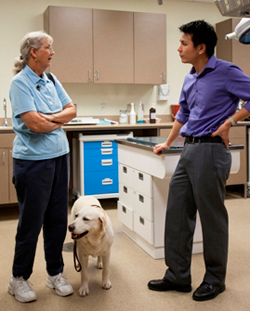First canine total knee replacement at University of Florida a success
The university's College of Veterinary Medicine joins a select group able to perform the procedure.
A few veterinarians at University of Florida's College of Veterinary Medicine can now add a new surgical procedure to their résumés. Earlier this year, the small animal surgery staff tackled its first total knee replacement, and months later, the results have been deemed a success.

The staff initially evaluated Mica, a nine-year-old Labrador retriever (shown at right; photos by Maria B. Farias), in February for progressively worsening osteoarthritis. The working dog had sustained an injury as a puppy, and while initially she managed well with medication, her condition had deteriorated during the last year and a half. Both her anterior and posterior cruciate ligaments were severely damaged and the cartilage in her knee almost completely worn away. At that stage, the only treatment alternative was total knee replacement.
Veterinarians at the university had never performed the procedure and enlisted the help of Matthew Allen, Vet MB, PhD, an associate professor in small animal surgery at The Ohio State University with expertise in canine total knee replacements. He joined Stanley Kim, BVSc, MS, and Antonio Pozzi, DVM, MS, DACVS, both assistant professors of small animal surgery at University of Florida, in the two-hour procedure.
In the months after Mica's surgery, she underwent extensive rehabilitation, which included underwater treadmill therapy, stretching and bending twice a day and daily walks. She recently ran her first hunt test since the surgery and passed with flying colors.

The surgeons are all pleased with the progress Mica has made and will continue to monitor her annually to ensure that she is using the leg well. "The most recent evaluation showed that her affected hind leg is gradually approaching the level of her normal hind leg," says Kim (shown at left chatting with Mica's owner, Kathleen Hornsby).
"Total knee replacement is a new treatment option for dogs with severe osteoarthritis," he continues. "Due to the equipment and surgical expertise required, the procedure can only be performed at a small number of institutions in North America. We now have the ability at University of Florida to restore excellent function to dogs' knees that are affected by a variety of disorders."
The university's small animal hospital is currently seeking dogs for a clinical study on total knee replacement. Dogs with severe osteoarthritis may be eligible for participation. More information about the study can be obtained by contacting the university staff at (352) 392-2235.